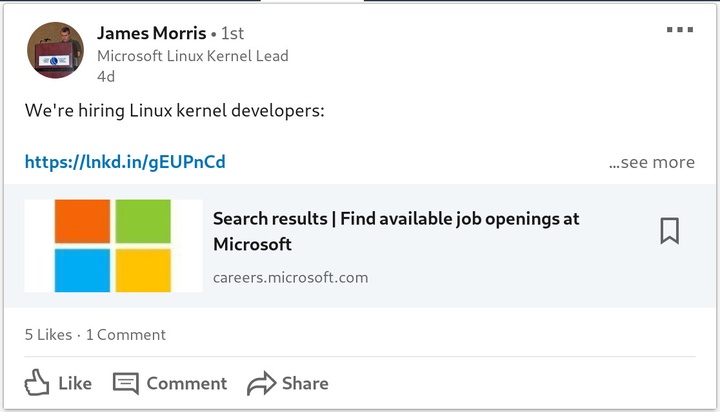Twelve years, and four psychiatrists!
Four?
I kept biting them!
Why?
They said you weren't real.
Tuesday, April 30
Okonomiyaki Edition
Tech News
- Mozilla might be shutting down development of Firefox for Android in favour of the new Firefox for Android. (PC Perspective)
The old one will receive bug fixes regardless, so worst case there will be a short period where it doesn't get feature updates, followed by a brand new version.
- AMD just turned 50 and are celebrating with 50th anniversary editions of CPUs and GPUs. (PC Perspective)
The specs are identical, though; the only difference is the packaging, and (for the GPU) the colour. If you want a cherry red Radeon VII, this is your chance.
- Vodafone found hidden backdoors in Huawei equipment. (Bloomberg)
On the one hand, this is entirely believable of Huawei.
On the other hand, it's Bloomberg, so the story is probably wrong in at least seventeen different ways.
Huawei says those backdoors were already there when they arrived. (ZDNet)
- Amazon is reportedly preparing an ultra-hi-fi music service to compete with TIDAL. (Tech Crunch)
The target audience is idiots with money, or possibly, bats. 96kHz / 24 bit is great for editing because it prevents degradation as mix all the tracks together, but nobody can tell the difference. Except bats, and they only ever sign up for the free trial and then cancel.
Video of the Day
Well, one of the girls who sang the theme song is Suzuka Nakamoto, better known these days as Su-metal.
The other two members of Babymetal, Yui Mizuno and Moa Kikuchi, got their start with the idol group Sakura Gakuin by performing this song as a duo at an audition.
Update: Everything is on the internet if you dig hard enough.
That's them. That's the audition that eventually led to Babymetal.
Also, there's apparently 51 volumes of ZKC manga now, most of it fan-translated. That's one volume for each episode of the anime. We need a new season, and not that The Unlimited thing either.
Posted by: Pixy Misa at
10:10 PM
| No Comments
| Add Comment
| Trackbacks (Suck)
Post contains 354 words, total size 4 kb.
Monday, April 29
Gyoza Party Edition
Tech News
- Sony just had its most profitable year ever. (WCCFTech)
Mostly due to their entertainment division and strong PlayStation 4 sales, which are rapidly approaching 100 million total units. The electronics side of things is a bit meh, with a few bright spots like camera sensors.
- If you have a Mac with Thunderbolt 3, you can add a Radeon 56 for $1199. (Ars Technica)
If you have a PC, $299.
- The Amiga still isn't dead. (Slashdot)
Stubborn little bugger.
Posted by: Pixy Misa at
08:54 PM
| No Comments
| Add Comment
| Trackbacks (Suck)
Post contains 97 words, total size 1 kb.
Anyone else having trouble with the edit functions, like trying to edit a post and it takes you to the post rather than the editor?
I think it was limited to just this site where I'm testing the always-HTTPS changes. I turned off my custom header template and it fixed the problem.
Posted by: Pixy Misa at
02:20 AM
| Comments (4)
| Add Comment
| Trackbacks (Suck)
Post contains 56 words, total size 1 kb.
Sunday, April 28
Nyanpasu Edition
Tech News
- Indiegogo has banned anti-vaccination fundraisers. (Tech Crunch)
Given the crap that Indiegogo allows, this is something of a surprise. I'm not sure how I feel about this. Yes, anti-vaxxers are dead wrong and get children killed. And Indiegogo are in no way obliged to help them do so.
But censorship for good reasons leads directly to censorship for bad reasons.
On the other hand, we are already neck-deep in censorship for bad reasons...
- AMD's Ryzen 2 chips are coming and so is a new chipset. (WCCFTech)
Available information suggests that it's a big upgrade over the X470. A PCIe 4.0 uplink provides double the bandwidth, and the PCIe lanes available from the chipset are upgraded from 8x PCIe 2.0 to 16x PCIe 4.0 - eight times the bandwidth. Though you can't use all of that at once since the uplink isn't fast enough.
Up to 12 SATA port and 8 USB 10 ports. Almost certain though that you won't be able to use it all at once - most likely the SATA lanes will share pins with PCIe lanes, so you can get 16 PCIe lanes and 4 SATA ports, or 8 PCIe lanes and 12 SATA, or something in between.
PCIe 4.0 does some magic here, delivering 8GB per second to the chipset, enough for two NVMe drives or a second video card.
- Facebook is run by crazy people. (Phoronix)
Picture of the Day

A colour page from the Non Non Biyori manga. The anime is entirely faithful to the manga (as far as I've read) in art and story, but rather less so in chronology. The second season of the anime isn't a sequel (or prequel) but more of an equel - it goes back and picks up chapters of manga that the first season skipped.
Each season of the anime covers one year, but it's the same year: The second season starts a day before the first and ends a day after. There's about four volumes of new manga since season two, so maybe a third season will continue from there.
This one is strongly recommended if you're looking for warm fuzzies. The most dramatic moment in the whole series is when the girls are out picking berries and get mugged by a squirrel.
More warm fuzzies it is then.
Update: I've been bamboozled. It's not slice-of-life, it's a cooking show.
Posted by: Pixy Misa at
11:44 PM
| Comments (3)
| Add Comment
| Trackbacks (Suck)
Post contains 455 words, total size 4 kb.
Saturday, April 27
Actually Got To Sleep In For Once Edition
Tech News
- As SSDs finally break the 10¢ per GB barrier flash memory producers are planning to scale back. (AnandTech)
Unfortunate but necessary if they are to stay in business.
- Western Digital announced a 4TB model of their Blue consumer SATA SSD. (AnandTech)
13¢ per GB is still pretty good. But we need something better than SATA. I suggest USB. 3.1 is faster than SATA, and 3.2 is a lot faster. And controllers and hubs and drivers already exist.
- If you need something a bit more enterprisey, Micron's 9300 NVMe drives might be just the thing. (Serve the Home)
2.5" form factor with U.2 PCIe connectors. Up to 15TB in the Pro model, and 12.8TB in the Max model designed for higher write workloads (in this case up to 38.4TB of writes per day).
4K write latency is said to be 11µs which is as fast as I've seen for conventional flash.
- California passed new transparency laws. So police departments responded by destroying old records so that it wouldn't be possible to turn them over. (TechDirt)
- Docker Hub got hacked. (Hacker News)
Data accessed included usernames - unimportant - hashed passwords - which don't matter as long as they were using something reasonably secure like Bcrypt or Scrypt or PBKDF2 - and GitHub access tokens, which is kind of a disaster.
- When setting an environment variable gives you a 40x speedup.
Basically, when the ls command needs to perform an extra 10,000 system calls to colour its output. Which in this case is always.
- Sri Lanka restricted access to social media after the wave of terrorist attacks over Easter, and is now restricting VPN access.
Governments should not have the ability to do this.
- HTTP headers for the responsible developer.
Web developers everywhere: Yeah, that's all very nice for you, but if I actually do the "responsible" thing, my application stops working.
Still good to know exactly which rules you need to break and why.
- Mozilla is shutting down its IRC network due to corrosion
- Linux 5.2 will support for case-insensitive filenames for EXT4. (Phoronix)
Configurable per director. Handy if you're working in a mixed Windows/Linux environment, though really I think everyone learned how to cope with this a decade ago.
- Alldocube's M5X is a good cheap tablet with mediocre cameras and a security hole in the font manager. (ZDNet)
If these thing shipped with stock Android it would be an immense improvement.
Anime Opening of the Day
Posted by: Pixy Misa at
05:55 PM
| No Comments
| Add Comment
| Trackbacks (Suck)
Post contains 430 words, total size 5 kb.
Friday, April 26
Bad Guy With A Leafblower Edition
- ASRock's DeskMini A300 gets reviewed. (AnandTech)
This is the Ryzen version of ASRock's functional-but-ugly mini-STX platform. With two full x4 M.2 storage slots (plus another one for WiFi) and two 2.5" drive bays, it's a pretty flexible little beastie.
- Intel says no chips for you. (AnandTech)
CPU shortages will continue for several months at least.
- Need a compact passively cooled 8 core system with integrated and optional dedicated graphics, two M.2 slots, four 2.5" drive bays, redundant power supplies, dual gigabit Ethernet ports, MiMo WiFi, and up to 128GB of RAM, with a proper server chipset that includes ECC support if your CPU allows it?
Oh, and a tiny integrated OLED display? And three serial ports? And an optional module for another four GbE ports and four extra USB 2.0 ports? (Though that replaces the standard front panel I/O.) And another optional module for another three M.2 slots? (Which I'm guessing uses the PCIe slot, because I can't see anywhere else it would fit.) And optional 4G wireless?
The CompuLab Airtop3 has you covered. (AnandTech)
At 30x25x10 cm it's a lot bigger than the A300's 15x15x8 cm, but it couldn't be much smaller; the front and back are full of I/O ports and indicators and the interior is absolutely packed.

It's an impressive piece of kit, though I wouldn't try it with a full 9900K. 9900T maybe, or even better a Xeon E 2146G. Slower, yes, but you get ECC support and your new toy won't double as a toaster oven.
What it is not - judging from the current Airtop2 build-to-order page - is cheap.
- How Facebook dealt with the Christchurch shooting videos. (TechDirt)
Under Australia's proposed laws they would be fined $7 billion for their efforts.
- Two companies are looking to be the Netflix of podcasts. (TechDirt)
Uh... Did anyone tell them that podcasts are free?
Oh, look, they've lined up a bunch of talentless hacks for their "premium" service. That's sure to work.
- Slack has filed to go public, and also mentioned it lost $139M down the back of the sofa. (Tech Crunch)
- Gmail is bad for email.
If they don't like you, they'll block you. And now you're screwed.
- "It’s like Lucky Charms got spewed all over the screen." (Thurrott.com)
Three guesses which app used by hundreds of millions of people that I just mentioned three seconds ago is being discussed here.
- 28 cores at 5.7GHz. (Tom's Hardware)
Liquid nitrogen may have been involved. Okay, liquid nitrogen was definited involved. Rather a lot of it.
- GitLab 11.10 is out.
- Amazon's AMD-based T3a virtual server instances are now available. (Serve the Home)
And they're a whole 10% cheaper than Intel. Isn't that exciting.
- Python 2 will likely be dropped from Fedora 32. (Phoronix)
EOL for Python 2 is coming up, and although my new code is in Python 3 (or just recently, Crystal), I do have 200,000 lines of Python 2 code in production. Ugh.
- Burn the witch! (Six Colors)
A Mac user asks for touchscreen support on MacOS.
- Dual socket servers make up 80% of sales, with 10% being one socket and 10% being four or more. But is that a real trend or just Intel's pricing strategies at work? (The Next Platform)
If a single socket provides 64 cores and 256GB/s of I/O, why exactly is the most common server platform going to continue to be two of those? Inter-core bandwidth and latency is much better within a die or package than between them.
- Anyone else remember when Donald Trump was being mocked for mentioning 6G wireless? (ZDNet)
"This summit is about 5G, but it is also 'Year 0' of the 6G era," remarked Nokia President and CEO Rajeev Suri.
How about that.
- Scientists discover nearly 200,000 kinds of virus in the ocean. (Quanta)
Okay, first, stop that, I'd rather not know.
Second, "kinds"? Actually, yes. Viruses reproduce but don't breed, so the concept of a species of virus is messy.
- Amazon Kerblam: Terrible HR as a Service. (The Verge).
- A 4TB MLC SSD for just over $400? (OWC via PC Perspective)
Wonder if I can get my boss to order 20 of them. That would solve our storage problems for a while.
Anime Ending of the Day
That was rather more wholesome than I expected from the title. What show was it we used to call "better than it has any right to be"? Popotan?
Anime Trailer of the Day
Well, that was good timing. Season 2 starts in July.
Posted by: Pixy Misa at
11:38 PM
| Comments (2)
| Add Comment
| Trackbacks (Suck)
Post contains 764 words, total size 8 kb.
Thursday, April 25
ANZAC Day Dawn Moving Van Edition
Tech News
- Intel's 2020 and 2021 client CPU roadmap seems to have leaked. (Tom's Hardware)
This includes Comet Lake (the rumoured up to 10 core desktop CPU), Rocket Lake (a mainstream CPU with integrated graphics), Tiger Lake (a low powered 4 core part built on 10 nm), Amber Lake (an ultra low power part for tablets), and Comet Lake and Rocket Lake Xeons.
Rocket Lake is supposedly due in Q1 2021 and will include PCIe 4.0, something that AMD will be providing this year, and will be supporting on existing motherboards.
If this roadmap is real and AMD does launch a 16 core mainstream CPU this year, it will be three years before Intel has a counter to it.
- Mercedes has filed for declaratory relief against lawsuits by graffitists whose "work" is visible in car ads. (TechDirt)
Read Permanence by Karl Schroeder to see where we end up if this isn't slapped down.
- The director of the US Patent Office is either an idiot or a troll of the first order. (TechDirt)
- Microsoft's Azure revenue grew by 73% in the past quarter. (Tech Crunch)
Azure revenues are close to $40 billion a year now. No, I don't know why either.
- This web page is a useless pile of crap. (Internet Health Report)
Someone needs to poke Web Pages That Suck. Their country needs them.
- Facebook expects to be fined up to $5 billion by the FTC. (The New York Times)
Well, it's a start.
- SushiChain is a blockchain implemented in Crystal.
It looks interesting and may have some smart features but the documentation is... Well, mostly, it isn't.
Relevant Observation of the Day

Just finished Chunibyo. Well, both TV series, both OVAs, a couple of the little specials, and the second movie. The second TV series is a little wobbly precisely because the first series ended strongly, but the second movie puts everything back together.
The first movie is a retelling of the first TV series, so I've skipped that one for now. Watch it in that order: TV 1, OVA 1, TV 2, OVA 2, movie 2. All the little specials aside from the two full-length OVAs are optional.
I'm starting to run low on things to watch, having recently burned through:
Currently moving on to Danmachi and Non Non Biyori, which will hit the bottom of my unwatched pile. Then I'll need to move on to the partly watched stuff, both old (Zettai Karen Children) and new (Made in Abyss).
Recommendations welcome.
Posted by: Pixy Misa at
09:50 PM
| Comments (15)
| Add Comment
| Trackbacks (Suck)
Post contains 469 words, total size 5 kb.
Wednesday, April 24
Chunibyo Edition
Tech News
- Oppo's Reno 10x Zoom has a popup selfie camera. (AnandTech)
This one pivots rather than sliding, which might be a more robust design in the long term. 6.6" 2340x1080 OLED display, 48MP main camera, 12MP telephoto camera, 8MP wide angle camera, and 16MP front camera. Snapdragon 855 with 8GB/256GB and a 4065 mAh battery.
- Meizu's 16s is basically the same thing with no moving parts. (AnandTech)
Its front camera has a diameter of 2.5mm so while this model has a bezel it is very small. The headphone jack is also very small, being entirely absent.
- Nvidia launched their GTX 1650 which is simultaneously slower and more expensive than AMD's Radeon 570. (AnandTech)
It does use less power, though, so if you're stuck with an older OEM system and have to rely on slot power, it's probably the best you're going to find.
Most interesting part of this launch is that Nvidia didn't allow reviewers to test the card before, providing neither sample cards nor the drivers required to run this model.
Despite that, the verdict has been delivered already and it's a resounding meh. (Tom's Hardware)
The card they tested didn't even have the decency to run on slot power, its only real advantage. So make sure you check carefully if you need that specific functionality.
- Fractal Design produces clean, understated computer cases. This is not one. (PC Perspective)
Well, compared to some of the monstrosities out there I guess it still is, but ech.
- Sandisk may not have 1TB cards out yet but Lexar does. (SSD Review)
Well, review samples anyway. No listing on Amazon yet, but their 512GB model is a promisingly affordable $82.
- DO NOT WRITE YOUR OWN CRYPTOGRAPHIC PROTOCOLS. (TechDirt)
Is your name Bruce Schneier? I think not.
[I'm planning on ignoring my own advice tomorrow. Watch this space.]
- Intel announced 34 new CPUs. (AnandTech)
These are all just marketing variants of the Coffee Lake Refresh die, which is the same as Coffee Lake, which is the the same as Kaby Lake, which is the same as Skylake, which is almost identical to Haswell. More cores at the high end but those parts had already been released, so this announcement is a big dish of nothing.
- Washington Post music critic hates podcasts. (Washington Post)
"Just anyone can blather on endlessly these days," he added. "What is the world coming to?"
- QEMU 4.0.0 is out.
If you need to run S390 software with hot plug support, or Arm with more than 256GB of virtual RAM, or RISC-V with USB, this is what you've been waiting for.
- JavaScript is space cancer. (Reddit)
Best comment: I look forward to awe-inspiring images of the [object Object] supercluster.
- Gigabyte has a new 2U 256 core server. (Serve the Home)
Well, 4 node cluster, anyway. Time to plug in some 100Gbit cards and fire up OpenMP.
- Nintendo's Switch has now outsold the N64. (One Angry Gamer)
In one third the time, too.
- Memory prices are finally coming back down. (Tech Report)
Not to historic lows yet, but much cheaper than what we've been faced with the last couple of years.
AMD was also selling the 16 core Threadripper 2950X at about 20% off but that one's already gone.
Random Anime Screenshot of the Day

Posted by: Pixy Misa at
11:29 PM
| Comments (2)
| Add Comment
| Trackbacks (Suck)
Post contains 558 words, total size 6 kb.
Tuesday, April 23
Considered Harmful Edition
Tech News
- Modern C++ considered harmful.
Specifically, it is no better for memory safety than C, and arguably worse because it is more complicated and has more scope for subtle bugs.
Use Rust if you need to be close to the metal, Go if you like C syntax but don't need to be that close to the metal, or Crystal if you rightly loathe C syntax.
- AI models considered harmful.
At least, if you don't pay attention to them, they will keep doing their own thing while conditions around them change until the answers they produce are no longer even remotely correct.
- Online feuds considered harmful. (The Verge)
It's not the people who actually run the DDOS servers who go to jail, it's whoever the FBI can actually track down.
- Heavy metals considered harmful. (CBC)
Unless - ahem - bark bark I'm a shark.
- Language wars considered harmful. (Hacker News)
But fun. And not all that harmful, really.
- Notifications considered harmful.
Anyone with a busy social media account (on any platform) has turned off notifications. I don't and I have anyway.
- Facial recognition considered harmful. (Engadget)
Your facial recognition system is 99.98% accurate. Congratulations! You just matched it to a fake ID and arrested the wrong person.
- The EU considered harmful. (ZDNet)
Alles klar, Herr Kommissar?
- Zombie deer considered harmful. (The Compost)
"Zombie Deer Virus" is actually another prion disease. Like we need more of those.
Infected deer meat can be made safe by reducing it to ash. Seriously, no amount of cooking will stop a prion disease; you have to actually destroy the protein molecules.
- Google considered harmful. (Arxiv.org PDF)
We can't stop here, this is MS Fnd in a Lbry country.
- Free speech considered harmful.
Wait, what? Oh, the New York Times. Never mind.
- Lenovo ThinkPad P72 considered harmful - to your credit card.
A powerful mobile workstation, yes. Affordable, not so much.
- Scientific Linux considered, uh, deceased. (Phoronix)
It still works but there won't be a Scientific Linux 8. It's all CentOS from here on out.
- Windows 10 April update considered harmful.
If you're an antivirus vendor. They've been scrambling to fix things after Microsoft broke most third-party anti-virus software with a new patch.
- SanDisk pricing considered - rats, I missed the sale. (Amazon, via Tech Report)
It was $25 for a 200GB card, apparently. Now it's all the way back up to $31. And $64 for 400GB. Or A$100.02 including GST, which is not bad.
No sign of the new 1TB cards so far.
- Huawei considered harmful. (Tech Crunch)
Paywalls also considered harmful, but eh. Google and Facebook have stolen all the ad money and you have to make a living somehow.
Anime Stuff
- I tried Chunibyo when it first aired and bounced off after a single episode. Giving it another try now, and yes, it's a lot better than my first impression led me to think.
I've been watching a lot more anime lately because I've been working with Ethereum, and it's horrible beyond all imagining and I need something to reset my brain afterwards. Even Golden Time, which frankly was kind of bad.
Picture of the Day

Posted by: Pixy Misa at
10:24 PM
| Comments (6)
| Add Comment
| Trackbacks (Suck)
Post contains 545 words, total size 7 kb.
Monday, April 22
Toradora With Traumatic Head Injuries Edition
Tech News
- Elixir, Phoenix, Absinthe, GraphQL, Apollo, and (blearrgh) React.
That was almost a good combination. It's still a good article if your job involves building APIs.
- Amazon is exiting China. (pandaily)
If they could exit Australia too, that would be great. Things worked better when they weren't here.
- O(n2) in CreateProcess.
O(n2) has made a lot of people very angry and been widely regarded as a bad move.
This is from the same guy who wrote the seminal classic 24-core CPU and I can't type an email.
- China bans games involving poker, blood, and "imperial schemes" which is to say, politics. (Tech Crunch)
Who do they think they are, Sony?
Anime Review - Golden Time
The production values are top notch, the characters are engaging, the writing is often laugh-out-loud funny, and the plot is a train wreck. And not one of those interesting train wrecks where the explosions and screaming go on far longer than you would think possible, but one of those boring ones where it simply falls off a bridge into a river and everyone dies.
Things happen, Banri and Kouko and a group of fellow freshmen are kidnapped by Scientologists, Banri makes up a story about amnesia to fool them into letting the others go... And then it turns out that he didn't make it up. Cue the sound of air being let out of the show's tires.
Where it really goes off the rails though is a few episodes later when we see Banri's lost memories being represented by a ghost Banri. I thought that was a fine metaphor - losing your memory is as close as you can get to dying without actually stinking up the place.
The problem is, it's not a metaphor. It's an amnesia Force Ghost. Who places a curse Banri for not making the decisions ghost Banri wants him to make, and nearly gets the entire group killed... Only in the end they walk away with literally a scratch and it makes no difference to anything.
The occasional scene like this kept me watching:

Or this:



Picture of the Day

Posted by: Pixy Misa at
11:26 PM
| No Comments
| Add Comment
| Trackbacks (Suck)
Post contains 597 words, total size 6 kb.
15 queries taking 0.0047 seconds, 24 records returned.
Powered by Minx 1.1.6c-pink.











